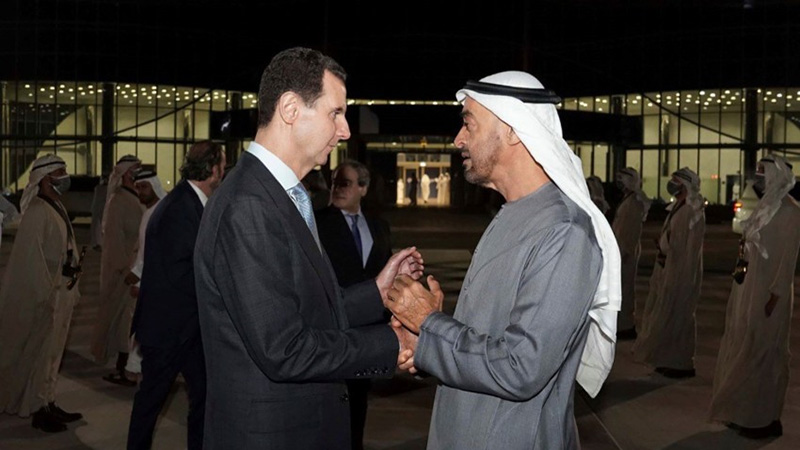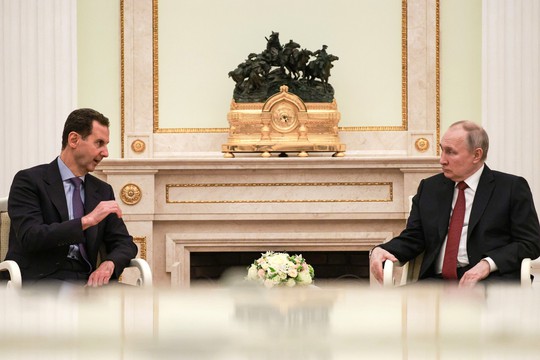Photo: Kremlin.ru
Russian President Vladimir Putin had a meeting with his Syrian counterpart Bashar al-Assad at the Kremlin where they discussed the political situation in Syria, international terrorism as well as issues of bilateral and humanitarian cooperation, TASS informs.
The Russian leader recalled that through the joint efforts the two countries managed to liberate the majority of Syrian territories from terrorists (as the Syrian government currently controls more than 90% of the country), while refugees actively return to liberated areas and people are rebuilding their homes. According to Putin, Assad is actively working to improve dialogue with his political opponents. The Russian leader voiced hope that this process would continue.
At the same time, Putin slammed the presence of foreign troops in several regions in Syria without a UN decision or Assad’s permission as a problem as, he believes, it prevents the country from "undertaking best efforts for the country’s consolidation."
In turn, Assad underlined that political meetings and talks held in Sochi and Nur-Sultan had particularly facilitated the normalization in Syria. "I would like to highlight the fact that the political processes which we used to carry out stopped approximately three years ago. There are certain reasons behind it. There are some states who do everything possible to destructively affect the opportunity to organize political processes," the Syrian leader emphasized.
He once again underlined that Russia made a large contribution to the victory over terrorists in Syria, thanking Putin for the assistance provided and also praising the Russian Foreign Ministry. According to Assad, the actions of two countries generally "made a huge contribution to the cause of protecting the whole humanity" from terrorism.
Moreover, the presidents talked about the bilateral economic cooperation. "In the first half of 2021, the trade volume increased by 3.5 times," Putin said in this regard.
 Syrian President Bashar Assad speaks with then-Abu Dhabi Crown Prince Sheikh Mohammed bin Zayed Al Nahyan, in Abu Dhabi, United Arab Emirates.
Syrian President Bashar Assad speaks with then-Abu Dhabi Crown Prince Sheikh Mohammed bin Zayed Al Nahyan, in Abu Dhabi, United Arab Emirates.
Photo: Syrian Presidency Facebook
Earlier Egyptian Foreign Minister Sameh Shoukry arrived in Damascus to meet with President Bashar al-Assad and express his country’s solidarity with Syria following the devastating earthquake, signifying continued warming of relations between the Syrian government and regional states.
The visit to Syria represents the first by a high-level Egyptian official since the start of the US-backed war in 2011.
The Egyptian Foreign Ministry had announced in a statement “that the visit aims to convey a message of solidarity from Egypt to Syria and its brotherly people after the disaster,” according to the state-affiliated Syrian news outlet, SANA.
A day after the quake, on February 7, Egyptian President Abdel Fattah al-Sisi held a phone conversation with Assad, expressing his solidarity and “his sincere condolences” in what was “the first official exchange” between the two presidents. Cairo was also among the countries that provided Syria with humanitarian relief aid through the Syrian Arab Red Crescent (SARC).
Egypt severed diplomatic relations with Damascus and announced its support for the opposition in 2013, during the presidency of the Muslim Brotherhood-affiliated Muhammad Morsi. Ties were restored the same year when general as-Sisi has become the President.
However, relations were never fully mended, and Damascus remains excluded from the Cairo-based Arab League after it was suspended in 2011. In recent years, Jordan and the UAE, two backers of the extremist insurgency in Syria, have restored their relations with the Syrian government.
Since the earthquake, Arab states have embraced Syria. Tunisia has expressed its intention to restore diplomatic ties, and even Saudi Arabia – who actively supported extremist groups with the aim of overthrowing the government – has expressed the need to ‘end the status quo’ regarding enmity with Damascus.
An Iraqi-led delegation of the Union of Arab Parliaments visited Syria along with a number of other Arab parliamentary leaders to express support for the Syrian people and call on all Arab countries to adopt a lasting decision for Syria’s reintegration into the region.
Syria’s gradual return to the regional fold has been much to the dismay of Washington, as it has continued to condemn any normalization with Syria throughout the aftermath of the earthquake.
Nevertheless, arab leaders are offering Syrian President Bashar al-Assad a deal that includes billions of dollars for reconstruction efforts and a pledge to lobby the west to lift sanctions in exchange for “[asking] Iran to stop expanding its footprint in the nation,” according to Arab and European officials that spoke with the Wall Street Journal (WSJ).
Other conditions set by the leaders of the unnamed Arab nations include a pledge from Damascus to engage with opposition and rebel groups, accept Arab troops to “protect returning refugees.”
Nonetheless, a Syrian government adviser told the WSJ that Assad “has shown no interest in political reform or a willingness to welcome Arab troops.”
Last month, US State Department spokesman Ned Price urged the international community not to let humanitarian assistance to Syria be accompanied by normalization, stressing: “[Washington’s] position on the Assad regime has not changed.”
The talks between Damascus and Arab leaders are reportedly backed by Saudi Arabia, which recently agreed to restore ties with Iran in a China-brokered deal. In recent weeks, Saudi officials have called for an end to the isolation of Syria to allow a response to its dire humanitarian crisis.
“There is a consensus building in the Arab world that the status quo is not tenable. And that means we have to find a way to move beyond that status quo,” Saudi Foreign Minister Prince Faisal bin Farhan Al Saud said earlier this month.
European and Arab officials also confirmed to the WSJ that Syria’s regional reintegration would be high on the agenda at the next Arab League summit, set to be held later this year in Saudi Arabia.
In recent weeks, Jordan and Egypt sent their foreign ministers to Damascus for their first diplomatic visits since the war erupted in 2011. Other nations responsible for fueling the war in its early stages, such as Tunisia, have also announced plans to restore diplomatic ties.
Iranian Foreign Ministry spokesman Nasser Kanaani called it “a realistic approach” and “a positive step toward Islamic solidarity.”
…So, Syria has all the chances to restore normal relations with Arab neighbors.
read more in our Telegram-channel https://t.me/The_International_Affairs

 13:08 17.03.2023 •
13:08 17.03.2023 •























